Carlos Martínez
Last month, mariachimusic.com published an interview with Carlos Martínez in which he shared his feelings about becoming director of Mariachi Vargas de Tecalitlán. In this second part of the interview, Jonathan Clark speaks with Carlos about his family and his musical career.
JC: Please tell us a little bit about yourself, Carlitos.
CM: My name is Carlos Efrén Martínez Arreguín. I was born on May 16, 1980 in Guadalajara, Jalisco. My father was Fernando Martínez Barajas, a trumpet player who, along with my uncle Pepe Martínez, founded Mariachi Nuevo Tecalitlán in 1965. My mother is Teresa Arreguín Arellano. Both of my parents were born in the village of Tecalitlán. There are nine children in my family—five girls and four boys.
JC: In what order were the four brothers of Nuevo Tecalitlán born?
CM: The oldest is Fernando, then Ángel, then Alejandro. I’m the youngest of the four.
Fernando Martínez, Sr. (1946-1998)
JC: Where did your family get its mariachi roots?
CM: My paternal grandfather, harpist don Blas Martínez, who celebrated his 100th birthday last summer, was a member of Mariachi Vargas. I dedicated my composition “¡Viva don Blas!” a son that was recorded by Nuevo Tecalitlán, to him.
Blas Martínez with Mariachi Vargas in 1944
JC: Were any of your mother’s ancestors musicians?
CM: No, but like all good tecalitlecos, all of her relatives love mariachi music. She loves rancheras, and she sings them really well. At family reunions, she would always sing in duet with my father.
JC: When did you start to like mariachi music?
CM: I think it must have started in my mother’s womb, because I’ve loved this music for as long as I can remember. A cousin of mine has a video of me when I was four or five years old, crooning the son “Tecalitlán.” We’ve listened to mariachi music at home every day for as long as I can remember.
JC: Do you have a favorite recording?
CM: One day, when my uncle Pepe came to visit us from Mexico City, he gave my father a copy of the Mariachi Vargas LP Mexicanísimo. I was about six years old at the time. When I’d get home from school, I would put on the record and listen to it over and over again—I never got tired of it. In fact, I wore it out! I loved the entire record, but “Violín Huapango” had the greatest impact on me. My father had a good record collection, so I was able to familiarize myself with almost everything that Mariachi Vargas had ever recorded. The more I listened, the more I liked what I heard, and that’s how I fell in love with mariachi music.
JC: Is there someone in particular whom you admire in the mariachi world?
CM: Of course! My uncle Pepe has always been my idol. Since I was a child, I always said, “I want to be just like my uncle Pepe!” because I thought he was the epitome of Mariachi Vargas. He wore every hat—playing, singing, directing, composing, and arranging. And, when I grew up, I realized that the arrangement for “Violín Huapango,” the piece I liked so much as a child, was one of his. You can imagine the family pride I felt! My aunt Angelina, Pepe’s wife, tells the story of a family gathering when I was six years old. She says I approached my uncle Pepe and told him, “Someday I’m going to be director of Mariachi Vargas, Lord willing!”
JC: Other than your uncle Pepe, which other arrangers do you like?
CM: Well, Rubén Fuentes is my all-time favorite. All of his music is impressive. And there’s another arranger who inspired me greatly, and whose music fascinates me to this day—maestro Rigoberto Alfaro. I liked his arrangements long before I knew they were his. I used to listen to recordings by Vicente Fernández and others, and say to myself, “That sounds fantastic!” And, when I found out who did the arrangements for those songs, it was almost always Rigoberto Alfaro. Only later did I learn that he had been a member of Mariachi Vargas. And, he’s still writing great arrangements!
Carlos with Vicente Fernández and Rigoberto Alfaro
JC: What other groups besides Mariachi Vargas had an influence on you?
CM: Nuevo Tecalitlán, of course. I also listened to recordings by Mariachi México de Pepe Villa, Los Camperos, Los Galleros, Mariachi Cobre, Mariachi de América, Mariachi 2000 de Cutberto Pérez, Mariachi Sol de México… There are so many great groups! I think it’s wonderful that so many compañeros love mariachi music.
JC: When you were six years old and listening to Mexicanísimo, did you already play?
CM: I had a small violin that my father had bought me, and I began learning the sones off of records, God only knows how. I already identified with the violin at that early age, but it was more like a plaything—I wasn’t studying it seriously yet.
JC: When did you begin to study music formally?
CM: When I was about 10 years old, my father realized that I liked music and suggested that I start studying it. My older brother Fernando was already studying with maestro Ramón Becerra from the Jalisco State Philharmonic Orchestra, and sometimes I’d go to his lessons with him. One day, I finally said to my father, “I want to study the violin seriously now,” and he immediately asked the maestro to give me lessons. That’s how it all began. He had to teach me the basics of music notation, because I wasn’t familiar with it yet. Thanks to that teacher, I slowly began acquiring musicianship skills.
After studying with maestro Ramón for about two years, he invited me to join a youth orchestra that he had organized. Around that time, I began to get more proficient on the violin. Then, when I was 13, I joined a youth group called Mariachi Los Gallitos. Andrés González, who’s now a member of Mariachi Vargas, was also in that group. We accompanied the children’s ballet folklórico group from the University of Guadalajara.
JC: When did you begin to write musical arrangements?
CM: My father gave me the opportunity to create my first arrangement when I was about 14 years old. My dad always helped me, and my uncle Pepe, whenever he was around, would give me advice like: “Listen, son. Don’t put that there, because it interferes with the voice. Use this range for the violins, because it lets them shine. Don’t write the trumpet part so high, harmonize the voice in a way that brings out the best in the song.” I always had support from my father and my uncle, and I consider myself a student of both.
JC: ¿How did you come to join Mariachi Nuevo Tecalitlán?
CM: When I was 15 years old, my uncle Pepe was visiting from Mexico City, and there was a gathering at our house. There were guitars and singing, and my father said to me, “Carlitos—play a song for your uncle. Play “Son de la Negra” for him!” My uncle said, “Come on, let’s hear you,” and I began to play and sing “La Negra.” “Good job!” my uncle exclaimed, and he told my father, “You should give this boy a chance to play in your mariachi, so he can gain experience.”
JC: Were you the youngest member to join Nuevo Tecalitlán?
CM: I think so. I don’t remember anyone ever joining at a younger age.
JC: What were your first days in the group like?
CM: They were good. I received a lot of support, both from my family and the other group members. Every day, my brother Fernando pushed me to work harder, “Come on, let’s practice now. Here, learn this song…” The truth is, I feel fortunate to be in the family I’m in, and I feel extremely grateful for all that God has given me.
JC: Tell us a little more about your musical studies. You mentioned to me that your next teacher was the great violinist, maestro Victor Scholz.
CM: I only studied with him for a year and a half. He was in poor health, so he sent me to study with one of his best students, maestro Sergio Caratachea.
JC: Beside the violin, what other musical studies have you undertaken?
CM: At around age 12 or 13, when I was with Los Gallitos, I studied in the children’s program at the University of Guadalajara’s Centro Universitario de Arte. Later, in 1997, when I was 17 years old, I studied solfege, harmony, vocalization, choir, piano, and various other subjects at the Escuela de Música Sacra (School of Sacred Music). I dropped out of that program in 1998 when, unfortunately, my father passed away. I was in school in the morning, and I had to play with the mariachi at a restaurant in the afternoon, which made it difficult to continue my studies.
JC: Where else did you study after the School of Sacred Music?
CM: I continued studying on my own until 2009, when I enrolled in the University of Guadalajara with the intention of obtaining a degree in music composition.
JC: What was your objective?
CM: One of my dreams has always been to write for orchestra. And, of course, I would love to write works for orchestra and mariachi. I’m very grateful to my maestro Manuel Cerda for his support, and for everything that he has taught me in this regard.
JC: What are some of the classes in that degree program?
CM: Harmony, counterpoint, fugue, solfege, dictation, music history, etc.
JC: Isn’t it going to be difficult to finish your studies now that you’re a member of Mariachi Vargas?
CM: Honestly, yes. But, fortunately, my professors are allowing me to present my schoolwork on the days I’m able to be in Guadalajara.
JC: So you still have plans to complete your degree in composition?
CM: Yes, indeed! This is a lifelong goal of mine, and I feel certain I’ll achieve it, Lord willing.
JC: You haven’t been a member of a lot of different mariachi groups like most other mariachi musicians, right? In my case, for example, I’ve been a member of at least 50 groups—and that’s a low estimate!
CM: No. I was with the children’s group Los Gallitos for two years, then I spent the next 18 years with Nuevo Tecalitlán. So, Mariachi Vargas de Tecalitlán is only the third mariachi of which I’ve been a member.
JC: Speaking of Mariachi Vargas… You joined the group only about a month and a half ago (March 12, 2014). How are things going with you in that group?
CM: I feel very content because we’re working well as a team, and I’ve formed some wonderful friendships with my fellow group members. I feel that I have their full support, and I’m truly excited about having this opportunity to be part of Mariachi Vargas.
JC: Have you mounted any arrangements with the group yet?
CM: Yes. I’ve mounted an adaptation of the theme “Mi País,” as well as an arrangement of a beautiful song called “Llorando Por Dentro,” that was one of the Hermanos Castro’s hits. I hope you get to hear these soon. We have upcoming concerts in California, Nevada, Arizona, and Kansas (see calendar). And on June 7th, we’ll be in Austin, Texas.
JC: Thanks so much, Carlos, for this terrific interview. All my mariachi friends and I are rooting for you! Would you like to bid farewell to our fine internet audience?
CM: Your friend, Carlos Martínez, a true mariachi at heart, sends all of the readers of mariachimusic.com cordial greetings and an affectionate embrace. Long live mariachi music! ¡Sí, señor!
The first Texas performance of Mariachi Vargas de Tecalitlán under the directorship of Carlos Martínez will take place on June 7, 2014 at the Long Center, in Austin, Texas. Tickets will be sold at the 3M Box Office, (512) 474-5664, beginning May 7th.
Please leave your comments below.

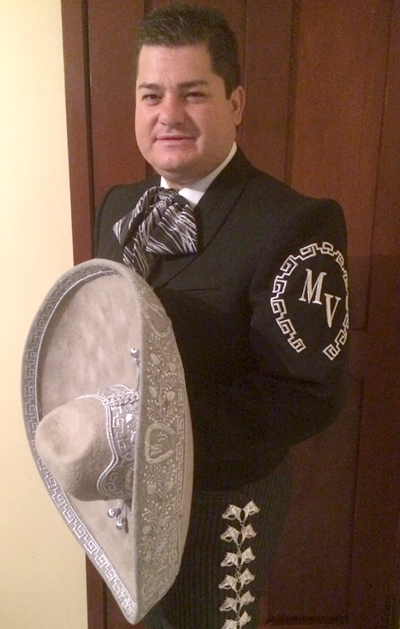
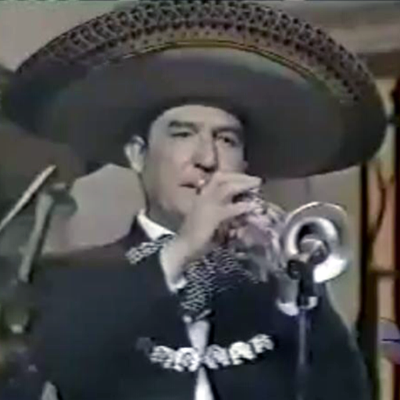
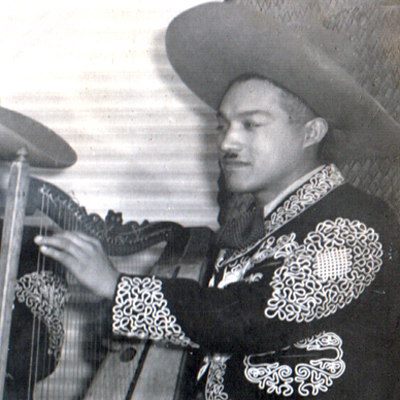
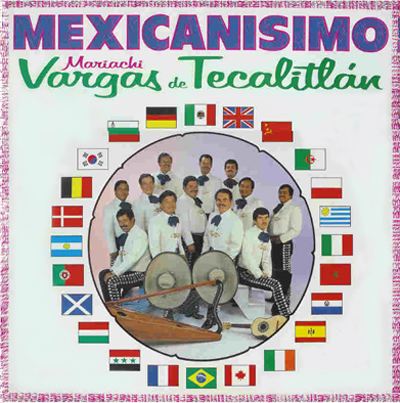


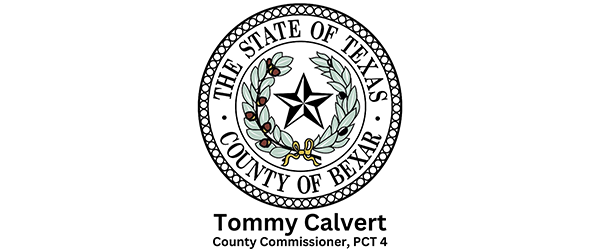



Además de ser un gran músico, mi primo es un ser humano excepcional.
Tiene un gran carisma…
Hace unos diez o doce años yo pronostiqué este nombramiento y les dije que el único que se perfilaba para dirigir al Mariachi Vargas en un futuro era CARLOS MARTÍNEZ, por su talento y su carisma. Yo no tuve oportunidad de tratarlo mucho tiempo, pero siempre se me hizo muy buen muchacho. Para él, mi admiración y mi respeto. Que Dios lo ilumine y que lleve al mejor mariachi del mundo por la misma senda que llevó por tantos años al Nuevo Tecalitlán. ¡VIVA EL MARIACHI Y LA MÚSICA MÁS HERMOSA DEL MUNDO, SÍ SEÑOR!
Su amigo, Juan Reyes.
Felicidades por el nombramiento. No es fácil ser el director del mejor mariachi del mundo. Todo el éxito y la mejor suerte de la música mexicana. Saludos.